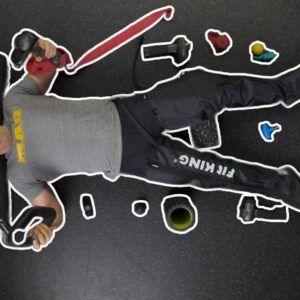James Riley
There is something special about lifting that seems to jive with the human spirit. The idea that there isn’t an end game, just a constant battle against the iron. The idea that no matter where you start, it is only important THAT you start and that you keep going.
Today we talk to James Riley, a self-proclaimed numbers dude (with a PhD to back it up), who has struggled with depression most of his life but has found through lifting that he can not only stay on track, but learn how to apply those lessons learned in the gym in other areas of life.
His involvement in the GGC has taken him to compete in his first sanctioned meet this past February. The dude is actively getting physically and mentally stronger each and very year.
Let’s find out a little more about James.
Tell us about yourself
I’m in West Yorkshire, UK. I studied math at the University of Leeds to a PhD, and managed to find work as an Operational Researcher for the UK Government. Mostly that means writing code to model probable outcomes of a particular Gov decision.
I’m a massive data nerd so I’ve done ad-hoc analyses for the GGC the years I’ve been involved. Unofficially, and just for fun. [insert links]
If anyone else is interested in getting involved in playing with the data, I can organize us a Discord and a public GitHub or something.
Do you have a background in sports?
None of my state schools (“public” school means “fee paying” here. It’s totally confusing.) had weight rooms. School sports tended to mean soccer or the occasional bleep test. As I was undiagnosed autistic at the time, team sports were a giant pile of anxiety and I thought I hated sport.
How/when did you start lifting? Why?

I’ve struggled on-and-off with depression for as long as I can remember, and started getting treatment about age 20/21. One of the drugs they gave me made me feel like I was about to starve to death all the time, so I gained a lot of weight. Unsurprisingly, I had to deal with some sciatica with the extra mass on my frame.
I had an on-and-off relationship with calisthenics since XKCD linked to Fitocracy – xkcd: Oversight, and the lovely people there introduced a newbie to /r/bodyweightfitness. I tried weight training a little bit at Uni, and this clicked with me. Team sports are not my thing, running isn’t my thing – I’ve done the first 2 weeks of Couch to 5k a few times, but resistance training gives me the happy chemicals.
How did you get started in your garage?
Coming out of my sciatica pain I had a 1’’ barbell/dumbbell set, and no rack. I told myself that if I could keep up a routine long enough with that then I’d upgrade to 2’’ kit, rack, bench etc. This is now the longest I’ve kept up some sort of fitness training. It’s always up to you whether a break from lifting is you quitting or just taking an (extended) break.
UK garages are tiny, I don’t think we could fit our car in there even if we emptied it. My rack is sandwiched between two plate trees, my bench folds upright to stand inside the rack when I’m not using both.
Do you ONLY train at home?
Nah! Mostly at home, but I go to a local-ish (30-min drive) gym where the regional powerlifting club is. Socializing is good, and I’m unlearning some mistakes I dialed in when I had nobody else in the room.
Pros and cons of lifting at home?
Depression kicks my arse sometimes. Some days I don’t have the energy to drive to the commercial gym I go to, but I can walk 10 feet to the garage. Even if I just do the warmup, heck, even if I go off script and do something for fun or mobility, it’s boosting my mental wellbeing and I don’t feel that I’ve wasted a drive.
Space is a massive negative on this side of the pond – picture the population of Cali + Texas in an area the size of Oregon. When I buy kit I’ll spend a little more since I’m buying less kit, and it needs more uses. e.g. trigrip plates are close enough to a kettlebell, or for farmers carries.
We also don’t tend to have any climate control in our garages – in winter I’ll store my bars inside to keep them room temperature, in summer I get a good warmup carrying stuff outside into the shade.
This can be glorious though – looking up from a bench to the stars is amazing. And I can hide a few of the non-alcoholic beers in the garage for something refreshing in-between sets, and keep them cool.
What kind of equipment did you start with? What do you have now?

I started with 1’ bar, 1’ adjustable dumbbells, a bunch of vinyl. I’ve DIY-ed bits as I’ve gone along – check the carry capacity of a rucksack before filling it with tins and soda for weighted carries!
I got a squat rack, bench, and a 2’’ bar set from powerhouse fitness to get started. No referral links – I’m happy enough with these guys to mention them without being paid to do so. I’ve added 2 weight trees, more plates, some oly rings from the ceiling… I built a sled for weighted push/drags, but really, it’s just eating space these days.
I’ve covered my rack/bench frames in stickers. They’re mine, I want them to look like mine!
When I PR I put a sticker on the squat rack on top of the old sticker.
I have mates over sometimes – there’s another advantage: getting friends involved for free. Anyway, their PRs on bench/deadlift/squat/ohp are chalked on the walls.
One of the most useful bits of kit is my A4 chalkboard. I can write my workout out, tweak it, tick stuff off as I go along, without worrying about dropping my phone or filling it with chalk.
What got you interested in the GGC?
I assume Reddit, I don’t remember my first year right now! At the time I definitely wasn’t ready for a non-online meet, so it was interesting to dip my toes in competing.
GGC gave me the confidence to get in touch with the local powerlifting club, and I took part in a regional meet in Feb – https://openpowerlifting.org/u/jamesriley7 .
What has been the key pieces to your success, in the GGC and lifting in general?
Dr Helms said something that I hadn’t quite crystalized as a thought with the strength training pyramid – consistency is far more important than programming, choice of lifts, supps, … If there’s 2 choices of program and I feel motivated to do one and the other feels like a chore, then unless the first is actively harmful, the first is optimal for me.
Basically, have fun with the process. This applies to the gym, obviously. Nobody suddenly Arnolds. But this applies to any process. Through therapy I’m learning to apply this outside the gym.
What motivates you to lift, day after day, year after year?
I’ll give part of the story that’s important and I don’t think is talked about enough – I have given up working out more times than I can count. The 10 years on-and-off probably has more “off” than “on”.
So first: find something you enjoy. I just looked out my window and saw folk jogging. Good for them, but I hate jogging 😀
I’m dyspraxic enough that I am generally very out of contact with where my body is in space and what signals are happening. When I do a squat, I am incredibly in touch with my posterior chain for a few seconds (that feel much longer).
I’m finding that training towards a comp is very motivating to me.
How are you preparing for the 2022 Garage Gym Competition?
I’ve just started a new training block (on the Stronger By Science program) following my comp. I’ll give it a couple of weeks and will consider juggling stuff around to get a deload in immediately before this year’s comp, or I might just throw it in as a bonus workout that week.
I’m also gently poking my mates that turn up in not-winter that it might be fun to hold a mini-meet at the garage for the GGC.
Thanks for sharing James!
You can follow James and his GGC lifting on his Instagram: https://www.instagram.com/jimr1603/



